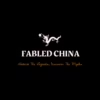The Golden God, Ruchou (蓐收), not only shared the sacred duty of supervising the Sun Gods with his father, but also held the responsibility of overseeing divine punishments in the heavenly realm.
Legend tells of the ancient state of Guo (古虢), an important vassal state in the early Zhou Dynasty. After King Wu of Zhou (周武王) overthrew the Shang Dynasty, two brothers of King Wen of Zhou (周文王) were appointed as rulers of Guo, one governing the western part, and the other the eastern part of the state. Guo acted as a crucial defensive barrier for the Zhou royal family. Over time, the western branch of the Guo state moved eastward, with Guo Shu (虢叔) taking control of Shangyang (上阳) and being called South Guo, while Guo Zhong (虢仲) governed the lower region of Yang (下阳) in present-day Pinglu, Shanxi, becoming North Guo.
In the same period, a new Guo state, called Little Guo (小古虢), was established by the western branch of the Guo clan and the Qiang (羌) people. This new state, blessed by the Eastern Zhou royal family and possessing a powerful military, quickly expanded its territory into what is now parts of Henan and Shanxi, building strongholds and even defeating the Quanrong (犬戎) army, which had sought to expand eastward.
While the state of Guo prospered for a time, its ruler, King Chou (国王丑), became notorious for his excessive luxury and indulgence. Shortly after ascending to the throne, he embarked on grand building projects to demonstrate his achievements. He constructed magnificent palaces and lavish buildings, all decorated extravagantly. At the same time, he led frequent military campaigns that drained the kingdom’s resources, causing unrest and discontent among the people.
At this time, Guo’s neighboring state, Yu (虞国), had become a strategic concern. The Jin state (晋国) sought to pass through Yu to reach Guo, and one of Guo’s senior ministers, Xiao (嚣), warned King Chou, saying, “Your Majesty, Yu is our shield. If Yu allows Jin to pass, the Jin army will first destroy us and then turn on Yu.”
However, King Chou, who had received riches and gifts from the Jin court in an attempt to form an alliance, dismissed the advice. He arrogantly declared, “You are too old to understand! The ruler of Jin has sent us gold and jewels, and they are preparing to ally with us. I will grant their request tomorrow.” The old minister, though concerned, could do nothing but sigh and leave, harboring a troubling premonition: “Guo is doomed… Guo is doomed…”
The following morning, King Chou summoned Minister Xiao to the palace, and Xiao, thinking the king had come to his senses, entered happily. To his surprise, King Chou was pacing nervously in his chambers, looking pale and disturbed. Upon seeing Xiao, the king grabbed his hand and urgently said, “Xiao, you have served under three kings and are a seasoned historian. I had a strange dream last night, and I need you to explain it. In the dream, I was walking by the river at the ancestral temple when a bright white light suddenly appeared. On the riverbank stood a god-like figure, ‘with a man’s face, tiger claws, white fur all over, and holding a large axe.’ I was terrified and turned to run, but the god shouted, ‘Do not run! The Jade Emperor has sent me to bring the Jin army into your capital.’ I was so scared that I bowed, but the figure didn’t listen. When I woke up, I felt this dream was ominous. Please tell me what it means.”
After thinking for a moment, Minister Xiao closed his eyes and replied, “Your Majesty, from your description, it seems you dreamed of the Golden God Ruchou. He is the deity who governs divine punishment both in heaven and on earth. If you dreamt of him, you must be cautious. The fate of the ruler is in his hands, and he is a just and impartial god. Since he mentioned the Jin army, it means he already knows about your dealings with them, and he is warning you to be careful!”
King Chou, though frightened by the dream, was hoping for a more favorable interpretation. Instead, hearing such a stern warning from Xiao, he became enraged. He ordered that the minister be imprisoned and forced all officials to congratulate him on the “good omen” of the strange dream, hoping that if everyone else believed the dream was a blessing, it would change his fortune.
One of Guo’s officials, Zhou Zhiqiao (舟之乔), witnessing the king’s folly, remarked to his family, “I’ve heard rumors for some time that Guo is doomed, but I never believed it. Now, I see that these rumors were true. The king has had an ominous dream, but instead of heeding it, he seeks to turn it into a good omen. His foolishness will bring ruin.”
Six months later, the Jin state successfully gained passage through Yu, and launched a surprise attack on the lower region of Guo. They quickly captured the lower capital of Guo. Soon after, the Jin forces captured Shangyang, the capital of Guo, leading to the fall of the state. On their return, the Jin army also destroyed Yu, cementing the historical saying: “False Yu, the destruction of Guo” (假虞灭虢), and the phrase “The lips are gone, the teeth are cold” (辅车相依,唇亡齿寒), a reflection of the fragile alliances and the fate of those who fail to heed wise counsel.
